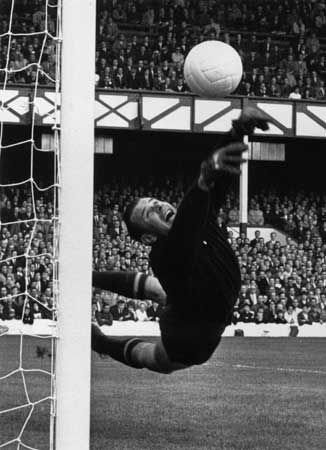
Football's most LOYAL XI
“I’ll take fifty percent efficiency to get one hundred percent loyalty.”
These are the words of Oscar winning filmmaker Samuel Goldwyn. And in today’s football world of mad money and frequent transfers, I guess finding a “loyal servant to the club” has become more difficult. Gone are the days when a player would commit his entire future to his club just because he was born and bred there.
The big money transfer of Fernando Torres provoked me to take Google’s help in finding out the most loyal players in football and I decided to come up with a Loyal XI team. This is just my view and in case of most of these players, I had to rely on youtube videos and fan pages. So, if you feel that I have left out any other player, do mention it in comments.
PS: The Loyal XI includes only the players who have retired.
LOYAL XI:
GOALKEEPER:
Lev Yashin

Known as “The Black Spider”, partly for his famous all-black attire and mainly because he appeared to have 8 arms whenever he was between the posts. Lev is regarded as the greatest goalkeeper in the history of football. He is known for his athleticism, amazing reflex saves, imposing stature and his unorthodox technique. He played for Dynamo Moscow for 22 seasons before retiring in 1971. He is credited for setting the benchmarks for modern day goalkeeping. In his career, Lev stopped over 150 penalties out of the 225 faced. He was awarded the European Footballer of the Year in 1963 and remains the only goalkeeper till date to win this award. In 1994, FIFA established the Lev Yashin Award for the best goalkeeper at the World Cup finals. FIFA polls named Yashin as the sole goalkeeper in World Team of the 20th Century. World Soccer Magazine named him in their The 100 Greatest Players of the 20th Century. He died in 1990 of complications caused by an amputation of one of his legs following a knee injury in 1986.
DEFENDERS:
Franco Baresi
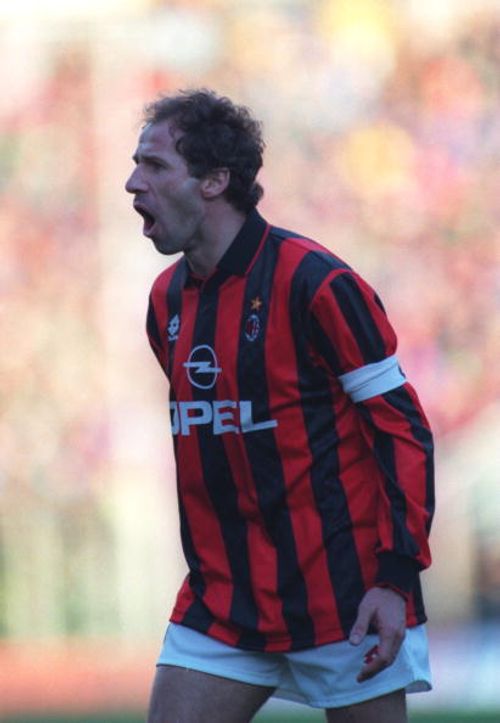
Acknowledged by many as the greatest defender to ever play, Baresi was nicknamed “Piscinin”, meaning “Little One”. Baresi played for AC Milan for over 20 years though ironically, he was rejected as a youngster at Inter. Baresi didn’t exactly fit in the frame of an ideal central defender, being just 5”’9’ but he generally operated as a Sweeper, just behind the defensive line. He is considered as the “best reader of the game” and has the honor of mentoring Paolo Maldini. He played 719 games for Milan before retiring in 1997 at the age of 37. In the meantime, he won 6 Serie A titles and 3 European Cups along with a host of other trophies. He was also a part of World Cup winning Italy team of 1982. He was named the “AC Milan Player of the Century” in 1999 and his jersey number 6 at Milan has been retired.
Willie Miller

Described by Sir Alex as “the best penalty box defender in the world”, ‘Mad Jolly Miller’ made around 800 appearances for Scottish club Aberdeen before retiring in 1990 due to an injury. A captain at just 21, Miller took his team to a League Cup success. Under his captaincy, Aberdeen won another 9 domestic titles and 2 European titles. Miller started as a striker but was quickly turned into a sweeper because of his tackling ability. An interesting incident shows his team mate’s faith in their captain. Ian Portfield took charge of Aberdeen and was unpopular. Before a match, Portfield named the side, discussed tactics and left the dressing room. Miller strongly disagreed with the tactics and told his teammates that they would be playing according to his tactics rather than Portfield’s. The players did exactly that and Aberdeen won 1-0, with Miller scoring the only goal.
Jack Charlton
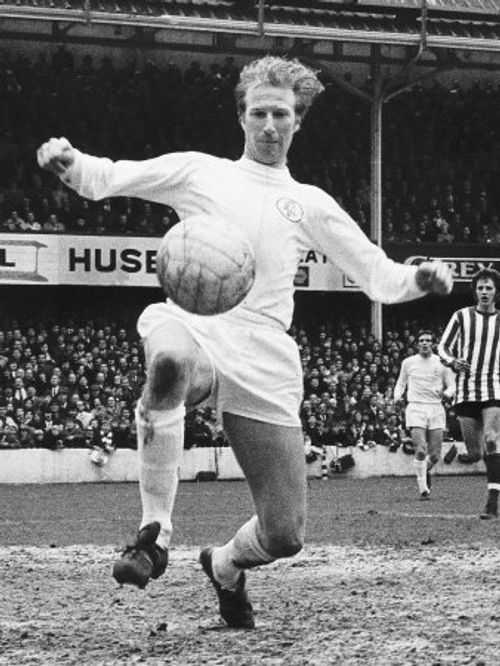
Brother of Manchester United Legend Sir Bobby Charlton, “Big Jack” played as a Central Defender for United’s bitter rivals Leeds United. Jack played for Leeds between 1952-73, making 629 appearances. He was a part of England’s victorious World Cup squad in 1966. The player was recognized by everyone, even the Pope. “Yes, I know who your are: you’re the boss,” Pope John Paul II said on meeting Charlton in 1990, when he was the manager of Ireland national team. A player who received many lucrative offers in his career, including two from Bill Shankly’s Liverpool chose to end his career with his childhood club Leeds. Charlton then went on to manage Middlesbrough, Sheffield Wednesday, Newcastle United and, for almost a decade, the national team of the Republic of Ireland. In 1996, the year after he resigned as manager of the Republic of Ireland team, Jack Charlton was awarded honorary Irish citizenship. A life-size statue of him can be found at Cork Airport.
Paolo Maldini

A versatile defender, who was equally at ease playing as a left back or a centre back, Maldini holds the record of most number of Serie A appearances. Son of Cesare Maldini, who played as a center back for AC Milan too, Paolo joined AC Milan training academy in 1978. He made his first appearance for AC Milan in 1985 and in his illustrious career spanning over 24 years, Paolo made a total of 902 appearances for Milan. The player has 7 Serie A titles, 5 European Cups amongst a host of other trophies to flaunt. Milan retired the number 3 jersey after his retirement. Though, if any of Maldini’s sons’ plays for Milan, the jersey would be given to him. His son Christian has already joined the Milan youth academy and looks set to continue the Maldini dynasty.
MIDFIELDERS:
Billy Wright

Described as “a national treasure” by The Times in 1959, Billy was the first player to play 100 internationals for England. A defensive midfielder, Billy spent his entire 20 year playing career with Wolverhampton Wanderers. Billy joined Wolves as a part of ground staff when he was just 14. He eventually took the field as a player and aged just 15, made his first team debut. Standing just 5”8’ tall, Billy’s main attribute was his pin-point passes. His career was hindered by the War but still, he managed to make 541 appearances for Wolves. He was the runner up for the 1957 Ballon D’Or. In 1998, he was included in a list of Football League 100 Legends and in 2002, he was named as the member of English Football Hall of Fame. Billy managed Arsenal from 1962-1966, though his career as a manager was not very successful. He died from stomach cancer on September 3,1994.
Trevor Brooking
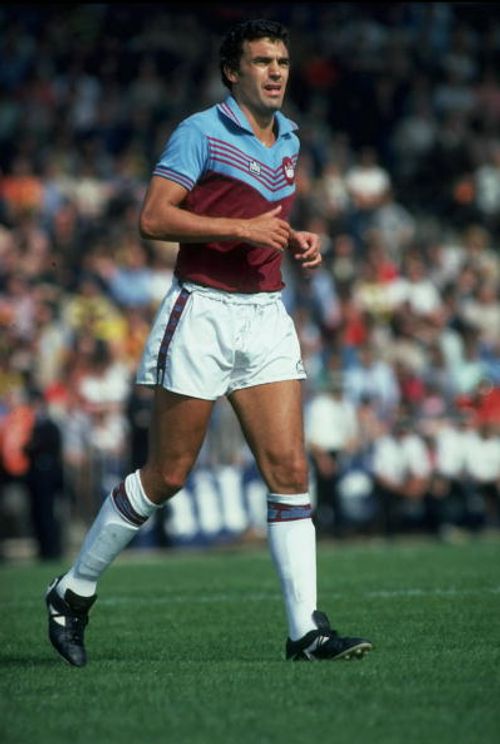
Respect; a quality that has become nearly extinct in the modern day football, Trevor Brooking is amongst the most respected sportsman known for his skill and sportsmanship. Amongst the most intelligent footballers, Brooking had a very clean disciplinary record throughout his career. An attacking midfielder, Brooking made 636 appearances for West Ham and 103 appearances for England between 1967-1985. He won two FA Cups with West Ham, first in 1975 and the second in 1980. After his last appearance for West Ham at Upton Park, in 1984, Brooking was carried off the field on the shoulders of supporters at the end of game. As a player; Brooking favored the attractive and skillful style of football, even if it doesn’t guarantee success. Even now, as an expert, Brooking has expressed his concern over the increasing number of foreign players coming to the premier league.
Matthew Le Tissier
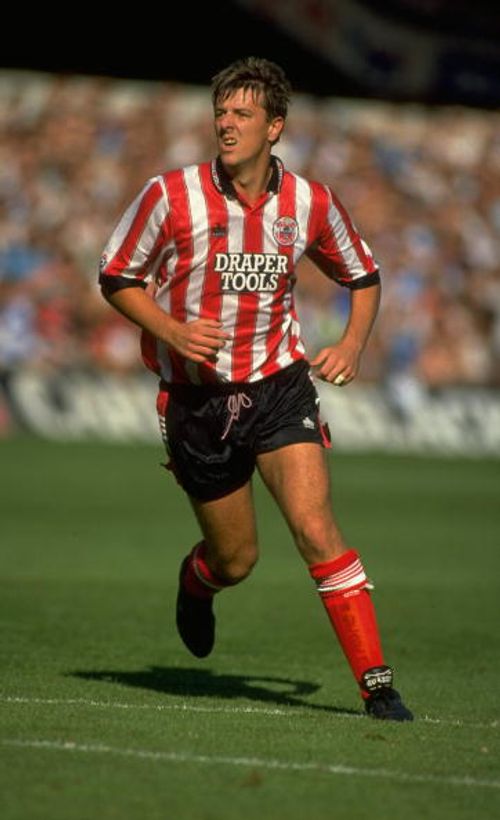
“Le God” was one of a kind player. No matter how big his oppositions were, Le Tissier would just play his own kind of football; the aggressive kind. In an interview, the man himself admitted that he sees opposition players as obstacles in his path of scoring. The Southampton player had a chance to move to big clubs like Chelsea and Spurs on various occasions but he decided to stay at the club which he joined in 1985 as a youth player. He wasn’t amongst the precariously gifted players but he had a constant awareness of what the opposition players were doing on the pitch. And if found out of place by even an inch, he mercilessly made them pay. He retired in 2002, after playing 540 matches for Southampton.
FORWARDS:
Geoff Bradford

The most prolific goal scorer Bristol Rovers has had in their entire history, Bradford still holds the record of most number of goals scored in a season for Bristol. A total of 260 goals in 511 matches was a result of his commitment, bravery and an eye for goal that made him a fan favorite at Bristol. An injury plagued player, Geoff always managed to overcome his injury problems and come out and score in big numbers for his club. After his retirement in 1964, Bradford became a petrol tanker driver, continuing to live quietly in the city of his birth. He died in Bristol on December 30, 1994.
Nat Lofthouse

The sturdy traditional Number 9, who devoted his entire career to Bolton Wanderers was born in Bolton in 1925. Nat appeared in 503 matches for Bolton, scoring 285 goals. He also scored 30 goals for England in 33 internationals. He was nicknamed “Lion of Vienna” for the courage he showed against Austria on international duty. During the match, Lofthouse was knocked unconscious briefly, but insisted on returning to the action despite a knee injury. His winning goal, which came even though the Austrian defenders committed three fouls on him in the process, was lauded to the skies. He also took Bolton to the famous FA Cup victory, defeating Manchester United in the final. Nat passed away on January 15, 2011.
Sir Tom Finney

Described by Bill Shankly as “the greatest player I ever saw in all my time”, Sir Thomas Finney dedicated his football career to Preston North End. Nicknamed “Preston Plumber”, Finney is still considered as the most versatile player, having played in all five orthodox forward positions that exist in football. Operating from either wings, Finney had a pin-point cross to compliment his blistering pace. Add to it, his ability of firing explosive shots from either foot, and you can see why the opposition defenders were terrified of him.
Finney was an established England player when Preston were relegated in 1948-49. Had he agitated for a transfer, Blackpool and Manchester United were ready to pay a record fee for his signature. But instead, he decided to stay with his childhood club. He was never booked in his career. He received the OBE in 1961, became President of Preston North End, a magistrate and chairman of his local health authority while continuing to run his plumbing busines. And in 1998, he received the revered knighthood. A statue in his honor stands outside the ground at Deepdale, which can be found on Sir Tom Finney Way.